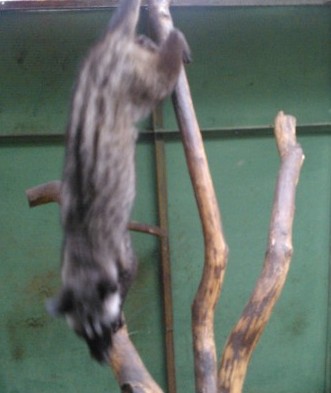Luwak Coffee - Civet Cat Poop Coffee
The favourite beverage for many was smooth with no bitter taste. This was no ordinary coffee. But one that has passed through the alimentary and digestive canals of the civet cat. The interactions with the stomach enzymes may have removed the bitter taste.
I normally do not take coffee as each time I drink, it gives me a huge wallop on my head. The headaches can last for 3 days. But I ventured to risk a it as this opportunity (with a few cups) was too good to pass. Mercifully no headaches assault came!
I was in a village cooperative that produce the dreaded and loved (depending on the sensitivity) gourmet and expensive beverage. The cats are supposed to pick up the best beans which is an acceptable rule of thumb.The same goes to bats and squirrels. However, these cats were in confinement and were fed with quality Arabica beans. Arabica beans were planted at only 1000m above sea level. It is considered the best beans. Robusta beans are not used as it is of poorer quality. In fact it was mentioned that the civets will turn their nose up at these beans.
Finally, before we jumped into the ethical debate on this practice the cooperative has set up standards of practices and cleanliness as well as the duration of confinement for these creatures. However, this may not provide scant comfort for animal lovers as being caged is still being caged.
My cuppa and cuppa and cuppa!
 Arabica trees.
Arabica trees.
Ripened and juicy coffee beans. So inviting!
The civet cat. The debate on ethics again is a hot topic as regards to these cats being imprisoned in the cage. The co-operatives will set these cats free after 2 years.
The poops after collection. It will be thoroughly washed. Any beans with cracked skin will be removed as this will fail the test on cleanliness.
Removing the outer skin. The light colour skin was removed exposing the darker colour interior. It was done by running a flat piece of wood over the beans on a wire mesh tray.
The washed seeds with skin intact not removed (lower tray) and with skin removed (upper tray).
The village co-operative's ladies working hard to process the beans.
I normally do not take coffee as each time I drink, it gives me a huge wallop on my head. The headaches can last for 3 days. But I ventured to risk a it as this opportunity (with a few cups) was too good to pass. Mercifully no headaches assault came!
I was in a village cooperative that produce the dreaded and loved (depending on the sensitivity) gourmet and expensive beverage. The cats are supposed to pick up the best beans which is an acceptable rule of thumb.The same goes to bats and squirrels. However, these cats were in confinement and were fed with quality Arabica beans. Arabica beans were planted at only 1000m above sea level. It is considered the best beans. Robusta beans are not used as it is of poorer quality. In fact it was mentioned that the civets will turn their nose up at these beans.
Finally, before we jumped into the ethical debate on this practice the cooperative has set up standards of practices and cleanliness as well as the duration of confinement for these creatures. However, this may not provide scant comfort for animal lovers as being caged is still being caged.
My cuppa and cuppa and cuppa!
 Arabica trees.
Arabica trees.Ripened and juicy coffee beans. So inviting!
The civet cat. The debate on ethics again is a hot topic as regards to these cats being imprisoned in the cage. The co-operatives will set these cats free after 2 years.
The poops after collection. It will be thoroughly washed. Any beans with cracked skin will be removed as this will fail the test on cleanliness.
Removing the outer skin. The light colour skin was removed exposing the darker colour interior. It was done by running a flat piece of wood over the beans on a wire mesh tray.
The washed seeds with skin intact not removed (lower tray) and with skin removed (upper tray).
The village co-operative's ladies working hard to process the beans.











Comments